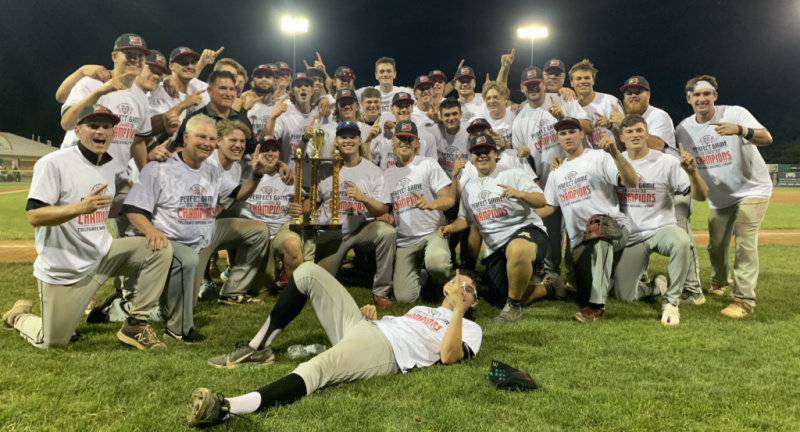(Story by Blake Dowson – Perfect Game)
This summer was a lot different for the Amsterdam Mohawks. Except at the end, it wasn’t.
With a roster that looked decidedly different than many of their previous ones – built mostly of small school grinders, unlike the Power 5-dominant rosters of years past – the finish line was the same, as the Mohawks took home their sixth Perfect Game Collegiate Baseball League title since 2012.
The Mohawks steamrolled to a 39-6 regular season record on top of taking home another league title, and with it, are Perfect Game’s Summer Team of the Year.
“This was a little bit of a different team,” Amsterdam team owner Brian Spagnola said. “We had lost a couple guys right before the season started that we considered to be some of our better players. For the first time, we didn’t have high-end draft guys…So what we ended up with was just a bunch of really good college baseball players. The amazing thing was these guys cared like no team I’ve ever seen. They bought in.”
Gage Miller led the charge for Amsterdam this summer. Miller, an infielder from Bishop State Community College, hit .400, scored 46 runs, notched 54 hits, including 15 doubles and seven home runs, and got on base by way of HBP 19 times. Each of those marks landed in the top-five in the league, and Miller was named PGCBL Player of the Year.
Miller was joined on the first-team all-league squad by his double play partner Brett Coker (Middle Tennessee State), starting pitchers Aidan Kidd (NJIT) and Cade Citelli (Texas-Arlington), and relief pitchers Santhosh Gottam (Brown) and Jack Sylvia (St. Lawrence).
Those six were joined by center fielder Nick Giamarusti (Pittsburgh), catcher Hunter Thomas (Rend Lake CC), and starting pitcher Collin Brougham (South Alabama) on the second team.
In total, Amsterdam had six regulars hit over .300, seven guys drove in at least 20 runs, and 10 scored at least 20 runs. The pitching was possibly more dominant. Five guys who threw at least 20 innings had ERAs under 1.00. Expand it out a bit, two more had ERAs under 3.00. Seventeen of the 20 pitchers to toe the rubber averaged at least one strikeout per inning.
“Miller was super consistent, and he was exactly like what the team was,” Spagnola said. “He just played hard and did really well. He was great. But it was a little bit of everybody. Brett Coker was a second-year guy, he was a bit older. Brett’s been around. He was a steady guy, he’s almost like your coach in minor league baseball, because he’s a man, he’s not a kid. So having a couple guys like that help.”
All that talent and all that success led to a heck of a summer in Amsterdam. It turned into a snowball effect. Folks of Amsterdam know the team is going to be good every year, and the team always gets good crowds at home games. But when word gets around that the team is winning at an 86 percent clip, playing hard and showing how much they care, there was rarely an open seat.
That, in turn, motivated the players ever more to play hard in a summer ball environment that at times can feel pretty laid back.
“We were sold out every night,” Spagnola said. “It was a great atmosphere, so the players love that. I’ve never seen a group of 35 guys, it’s so rare, who never complained, were unselfish, in a summer ball setting, especially. So it was amazing because we were really talented but even more so, they really cared. When you put that together, it was tough for them to lose.”
Spagnola and the coaching staff he has put together in Amsterdam really have this thing rolling. Amsterdam’s head coach, Keith Griffin, has been coming back each summer since 2009. He’s a baseball lifer, Spagnola says.
Between the two – Spagnola coached college ball in the past, too – they have built out quite the recruiting rolodex, and proven to schools sending players to Amsterdam for the summer that they’ll have a good experience.
That’s really the formula, according to Spagnola. And it’s been a winning one, so there’s really no need to change it.
“We’ve built great relationships with schools who send us good players, and our recruiting has become easy,” Spagnola said. “A lot of the same schools just tell us they’re sending us players each year. The players love it, because they get treated right…It’s not going to work if the players don’t go back [to school] better, and with a good experience. So that’s the key, they always go back and they loved it here, and they got better.”

